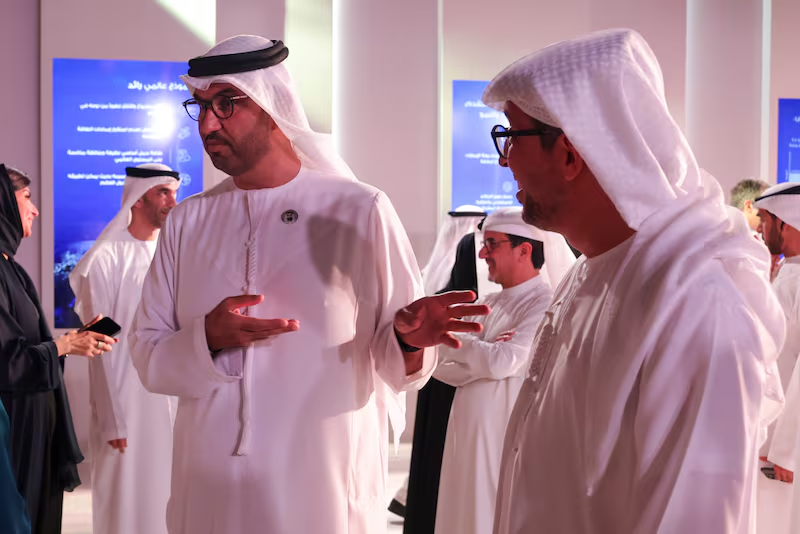Mega clean energy projects to boost AI and data centre growth in the UAE, says Masdar

Nov 4, 2025
Ground broken on Abu Dhabi's $6bn renewables centre that will provide uninterrupted power
Mega renewable energy projects in the UAE are envisaged to drive the growth of the artificial intelligence and data centre in the UAE, a senior executive at Abu Dhabi's Masdar has said.
Projects such as the new $6 billion round-the-clock renewable energy project in the capital will serve as a blueprint of how sustainable energy needs can be addressed, Abdulla Zayed, Masdar's director of business and project development, told The National on Thursday.
“Demand is increasing in data centres and the AI fields … they consume a lot of electricity. With the advancement of similar concepts of what we do, it will enable the technological revolution or AI revolution to even expand further and faster,” he said in an interview.
Mr Zayed was speaking as ground was broken on what it has deemed the world's first 24/7 mega renewable energy plant, being developed by Masdar and Emirates Water and Electricity Company (Ewec), which also boosts the UAE's profile in the clean energy sector.
The project is capable of delivering 1 gigawatt of baseload renewable energy around the clock at a globally competitive tariff. Once operational by 2027, the plant will produce gigascale baseload energy. The facility has a capital investment of more than Dh22 billion ($6 billion), state news agency Wam reported.
Baseload refers to the minimum level of electricity demand on a grid that should remain constant and is supplied throughout a day without interruption.
Work will now progress on the development in Al Wathba area that will produce a baseload of one gigawatt of uninterrupted clean power at a “globally competitive tariff”.
The combination of 5.2 gigawatts of solar capacity and 19 gigawatt-hours of battery storage will be equivalent to powering more than 500,000 homes, using “the world's most advanced technologies”, according to the companies.
The plant's impact will also help avoid about 5.7 million tonnes of carbon dioxide emissions annually and create 10,000 jobs, Masdar and Ewec said.
The project design features cutting-edge technology, including a virtual power plant, grid-forming and black start capabilities, and AI-enhanced forecasting and intelligent dispatch, Wam reported.
Sheikh Theyab bin Mohamed, Deputy Chairman of the Presidential Court for Development and Fallen Heroes' Affairs, attended the groundbreaking. Dr Sultan Al Jaber, Minister of Industry and Advanced Technology, and chairman of Masdar, and Dr Thani Al Zeyoudi, Minister of Foreign Trade, among other officials, were also present.
Dr Al Jaber said the gigascale project is a step towards redefining the role of renewable energy for the information age.
The project was first announced at this year's Abu Dhabi Sustainability Week.
The gigascale project “has proven today that it can be successful and achieved”, Mr Zayed said.
“The main challenge of renewable energy sources is that it's not stable; when the sun is shining or the wind is blowing, you'll have energy,” he said. “But when you do it with batteries, then it's stable and provides green, stable electricity throughout the day.”
Masdar, Abu Dhabi's clean energy major, and Ewec are open to expanding the project's capacity, but declined to provide specifics. The companies are, however, looking into developing similar projects within and outside the UAE, tapping into Masdar's presence in more than 40 countries, Mr Zayed said.
“From this project, we're planning to expand and do more, whether it's in the UAE, the region, Asia, Europe, Africa or the US; we have a lot of projects and partners throughout the globe,” he added.
The new plant comes amid increasing efforts within the international community to meet the global goal of tripling renewable energy capacity and doubling energy efficiency by 2030.
The pace of global renewable power generation continues to improve, with 582 gigawatts of additional capacity in 2024, the International Renewable Energy Agency said in its latest UAE Consensus report, based on the Cop28 climate summit that the Emirates hosted in 2023.
That marked a new global deployment record for a third consecutive year, the Abu Dhabi-based Irena said, “providing much-needed hope that the tripling target can still be met”.
The goals are critical to maintaining the 1.5°C threshold established in the Paris Agreement in 2015, a treaty in which 195 nations pledged to tackle climate change.
The global renewable energy market is projected to grow to more than $1.57 trillion by 2032, from about $1.08 trillion in 2025, a compound annual rate of 5.6 per cent, data from Fortune Business Insights shows.
“We will prove that what we have done in Abu Dhabi is a concept that can be replicated throughout the globe by proving that this is a success story that we can do,” Mr Zayed said.
While considering new regions for similar developments, Masdar will look into local regulations, site characteristics and the available solar and wind resources, he added.
“We've taken that problem and we came up with this; now, this problem can be given to us in any part of the world. But the concepts and the solutions will eventually be different,” Mr Zayed said.
“But in a country with rich wind resources … coupled with good solar resources, you can mix it … and this [will] reduce the overall size of investment.”
